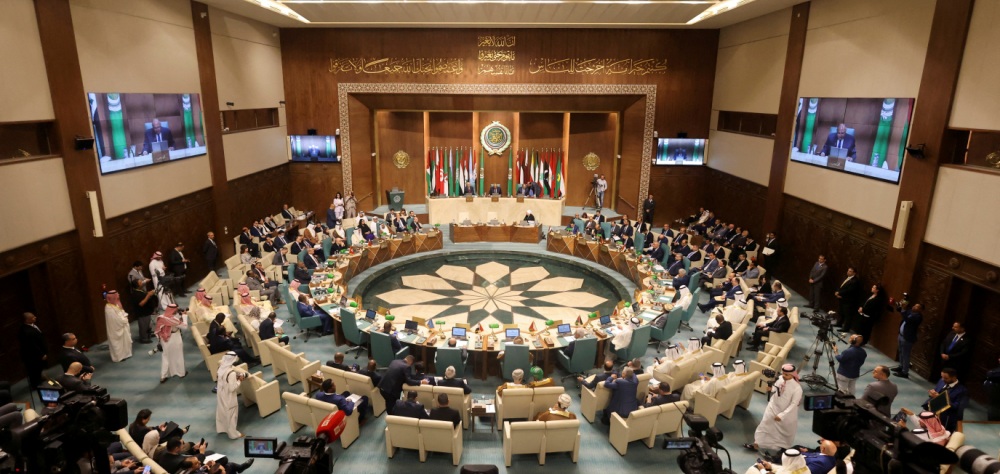Alwaght- Two weeks to the Arab League summit in Saudi Arabia, the long wait is finally over and the bloc voted to return to Syria its seat that has been suspended since 2011. The decision was made in a meeting of the bloc’s foreign ministers in Cairo on Sunday, showing that conflict of views among members, especially Qatar, has ended and a consensus around the need to mend ties with Damascus has emerged.
The green light to Syria’s return followed a consultative meeting of Saudi, Egyptian, Iraqi, Syrian, and Jordanian foreign ministers last week to discuss ways for return of the Syrian refugees to their country and facilitate government’s control over the whole territories and also settle the drugs trafficking challenge.
It is noteworthy that before this meeting, another consultative meeting was held by foreign ministers of the (Persian) Gulf Cooperation Council states plus Egypt, Iraq, and Jordan to discuss end of Syria suspension. The initial signs of consensus emerged in that meeting.
Citing its special sources, London-based Rai Al-Yaum newspaper reported last week that Saudi Arabia sent its envoy to Damascus to invite Syrian President Bashar al-Assad to the Arab League leaders’ summit. It has been said that al-Assad may visit the kingdom even a few days before the summit. Although the news reports surrounding this trip have not been confirmed or denied by Damascus, without a doubt the presence of al-Assad in Saudi Arabia shows that the US efforts by sending special envoys, including CIA Director William Burns and National Security Advisor of the White House Jake Sullivan in recent days and weeks to influence the decision of its Arab allies about the Syrian leader invitation have been a failure.
Washington gives away its anger by extending Syria-related US national emergency
While the Syrian return to the Arab League can mark a significant political achievement and a big victory to Damascus and people of Syria and promise economic recovery and reconstruction and help overcome the destructive fallouts of the 10-year crisis, since the beginning of the Arab re-embracement of the Syrian government, the US in various ways showed its opposition and anger at this approach, but found no listening ear among Arabs.
On Tuesday, President Joe Biden, apparently abusing the national security concept, extended for another year the US national emergency declared with respect to Syria, maintaining sanctions against Syria and showing that the US and Arab ways regarding Syria are now separated.
Relying on home and foreign support, Syria managed to obliterate terrorism and win the civil war and now the Arab countries are seeking to take advantage of political and economic cooperation with Damascus and settle the pending challenges like refugees. For example, only in Jordan, there are 650,000 Syrian refugees and Amman seeks ways to return them home.
The US president in a letter to the House said that Syrian actions continue to pose an “unusual and extraordinary threat to the national security, foreign policy, and economy of the United States.”
Later in March, Biden unveiled initial Caesar sanctions on Syria under the excuse of targeting drugs trafficking networks. The move apparently serves to block any Arab investment in Syria and trade partnership with Damascus to deprive the latter of benefits of return to the Arab League.
The US government’s national emergency act was approved on May 11, 2004 under false pretenses against Damascus, and has been extended every year since then. According to Biden’s order, this emergency will remain until May 11, 2024.
The Principal Deputy Spokesperson for the US Department of State Vedant Patel in comments that obviously betrayed the White House anger said: “We do not believe that Syria merits readmission to the Arab League at this time, and it’s a point that we’ve made clear with all of our partners.” The Secretary of State Antony Blinken even threatened Egypt and Jordan with consequences for their green light to Syrian return.
Still, the Arab negligence of the American dictations and pressure, for many analysts, is a sign of demise of the US influence in the Arab bloc and dominance in the region in general. This comes while global analysts describe Syria readmission an aftereffect of the historical Iranian-Saudi détente agreement that was inked in May with Chinese mediation, and this is leading them to the conclusion that the growing Chinese partnering and acting in major regional developments means the declining US power to influence regional countries’ policies.



























